Bachelor’s Program
In the Photography BFA program you explore and examine the social, cultural and historical contexts in which you work, in order to better understand the discipline and medium. Through close observation and guided discussions, you learn to read images and develop the visual literacy you need to articulate ideas and make meaningful work.
Curriculum
Following the first-year program in Experimental and Foundation Studies, in your sophomore year you begin the Photography BFA program by exploring analog and digital processes and techniques via various camera formats, traditional darkroom print production and digital workflows. Through close examination of photographs, you engage in deep critical thinking to develop a visual literacy informed by the history of photography, as well as seminars focused on the impact of photography in visualizing difference in class, race, gender and identity.
During junior year you expand on this knowledge, focusing on experimentation within the photographic medium and others, as well as materials, subjects and approaches to making. At this time you begin to produce self-directed projects, areas of inquiry, methods of research and articulation of conceptual and abstract ideas through group critiques, writing assignments and public presentations.
Your senior year is focused on developing work that will map a trajectory for an artistic practice that sustains itself beyond the bounds of the BFA and into a professional practice. The capstone degree project is a written thesis composed of critical reflection, influence and a definition of the scope and evolution of your own work, complemented by self-designed solo and two-person exhibitions in the Red Eye Gallery, the department’s dedicated exhibition space.
Learning outcomes
The program enables students to engage with, interpret and represent the world in meaningful ways. Graduates are prepared to:
- develop personally driven work that demonstrates complexity and individuality.
- approach their practice as an evolving, exploration of forms, ideas, issues, and materials that are the culmination of work ethic, reflection and research.
- shape the context and dialogue around their work through oral presentations and writing.
- show proficiency in advanced analog and digital techniques and how those techniques relate to the construction of meaning.
- demonstrate understanding and sensitivity of the power relationships of representation and photography.
- present ability to critically reflect on one's own work and others from open, challenging and collective viewpoints.
Undergraduate student work

Elia Giovanna BFA 20
Elia Giovanna BFA 20

Erin Wang BFA 20
Erin Wang BFA 20

Julia Abbott BFA 22
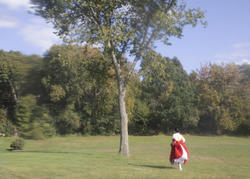
Julie Park BFA 22

Melissa Nyquist BFA 20

Niko Krivanek BFA 20
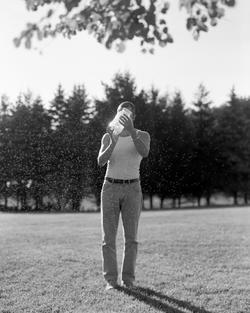
Owen McCarter BFA 22

John Shen BFA 20
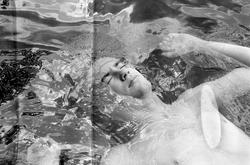
Olivia Reavey BFA 20
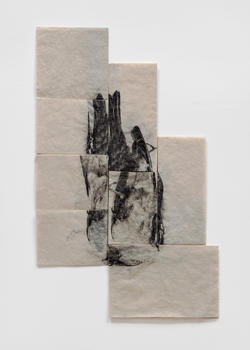
Travis Morehead BFA 20
Inspiring community
Around 30 undergraduates work in close proximity with roughly 15 graduate students (though they have dedicated studios in a separate building). Between crits, informal discussions and rotating exhibitions at the department's Red Eye Gallery, conversations with your peers about your ideas and work are central to the department’s culture.
A range of photographers with diverse approaches and styles come to campus each semester through the long-running T.C. Colley Lecture Series, while Professional Practice electives put you in contact with photographers working for commercial studios and photo agencies.
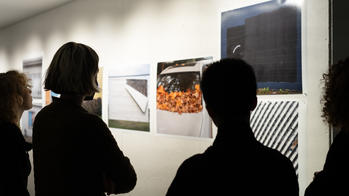
Learning environment
The Photography department is housed in the Design Center, which is home to the Red Eye Gallery, a dedicated exhibition space for use by Photography students. In addition, the department also has its own equipment checkout in the Design Center, the student-staffed Photo Cage. It features a wide range of high-end digital and analog cameras all for use by Photography majors, providing students with a broad range of technical exploration.
Students, faculty and staff work together to foster an environment of community, collaboration, openness and inclusivity both in and outside the classroom. We solicit student feedback, input and opinions on visiting artists, critics and department hires, and welcome alumni involvement.
Degree project
Senior students develop self-directed work that in their final semester becomes the degree project, culminating in a written thesis, a solo or two-person exhibition in our Red Eye Gallery and a portfolio for RISD’s archives.
The written thesis process requires critical reflection, research, and a map of how the concepts and subjects in current work will evolve going forward. Through the degree project, we encourage students to develop modes of inquiry that will clarify paths forward after graduation, as well as to develop professional practices that will support them in advancing their work within the context of sustainable practice beyond the confines of the institution.
Application requirements
Common Application
You’ll begin and manage your RISD application process by completing the Common Application. There is a nonrefundable application fee
Fee waiver
We want to make sure that application fees do not pose a barrier for any student. If you meet certain qualifications, you can request a Common Application fee waiver in one of the following two ways:
- Navigate to the "Fee Waiver" portion on the Common Application and select the option that most fits your family circumstances. This will allow you to submit your application without entering credit card information.
- If your situation does not match any of the Common Application’s waiver criteria, email admissions@risd.edu and we’ll process the waiver manually.
To receive a SlideRoom fee waiver, please email admissions@risd.edu.
Academic transcripts
Applicants must provide official transcripts of all secondary academic work through the most recent grading period. Your counselor may submit your transcript through the Common Application, Parchment, email or mail.
If your academic credentials are not written in English, they must be translated into English by an approved translator prior to submission.
Tests and test-optional
Test-Optional, SAT and ACT
We offer all applicants (domestic and international) the option to apply without submitting results from the SAT or ACT. You may opt into this process by selecting “test-optional” under the "Testing" portion of your RISD Common Application.
For students who choose to submit test scores, we will superscore your results, looking at your highest outcome across multiple test dates.
RISD’s institution code number for the SAT is 3726; for ACT the code number is 003812.
Transfer credits
You can use some Advanced Placement (AP), A-Level classes and International Baccalaureate (IB) credits toward RISD liberal arts requirements. First-year students can transfer a maximum of nine credits from AP courses with a score of 4 or 5, A-Level classes with an earned grade of C or higher or Higher Level IB scores of 5, 6 or 7. We will not accept AP or IB credit from art or studio classes.
VIEW OUR FULL TRANSFER CREDIT POLICY
English language proficiency tests
All applicants who speak English as a second language, including US citizens, must submit results from any one of these three options:
- TOEFL (Test of English as a Foreign Language)
- IELTS (International English Language Testing System)
- Duolingo (an online English test).
Since English proficiency is a prerequisite for acceptance, applicants are required to meet a minimum score of at least 93 on the TOEFL, a 6.5 on the IELTS or a 115 on Duolingo.
Plan to take the TOEFL or IELTS well in advance of the application deadline since it may take three weeks for your scores to be sent to RISD by the test agency. It may take up to four days for us to receive Duolingo test results.
The language test requirement may be waived for applicants who have completed their secondary education in an institution where English is the language of instruction. In addition, applicants must have three consecutive, full-time years of instruction without ESL, ELL or ENL courses. A waiver form can be found in the applicant portal and you can email the Admissions Office at admissions@risd.edu with any questions.
Portfolio
Portfolio submission
Your portfolio should present 12–20 examples of your most recent work showcasing your thinking and making. Once you've started your RISD application in the Common Application, you will be directed to the online platform SlideRoom to upload your portfolio.
What to include
The work you select should reflect a full range of your ideas, curiosity, experimentation and experience in creating and making. This can include work in any medium, in finished or sketch form, and can be the result of an assigned project or a self-directed exploration.
We strongly recommend that you include some examples that involve drawing and/or painting from direct observation (rather than from imagination, photograph or video). Since drawing and painting are fundamental tools for visual makers from initial concept to execution, it is valuable for reviewers to see examples of your experience with and approach to drawing.
While the majority of your portfolio should feature finished pieces, we suggest including some research or preparatory work in up to three—but no more than three—portfolio uploads/slides. This helps reviewers better understand how you develop your ideas.
Authenticity and documentation
The authenticity of the work in your portfolio is of great importance to the Admissions Committee. We will ask you to acknowledge that the work in your portfolio was conceptualized and created by you. In the case of collaborative work, we ask that you document your contributions and credit additional artists using the Additional Details field in SlideRoom.
We strongly discourage including excessive visual elements and text descriptions in a single slide submission. These are difficult to view and are likely to exceed the allowed submission limit.
You can submit additional angles or detail shots of some works across multiple slide submissions, combined into one composite including no more than three images, or in a single video upload. Editing is an important part of curating your portfolio. You may need to devise creative solutions to best show your work within the limits of submission guidelines.
We recommend the following file formats: jpeg, png, gif, mp4 and mov. These formats are most compatible with SlideRoom. We discourage Google Drive and zipped files.
You may be interested in attending or watching the recording of one of our portfolio tips webinars for more advice on how to approach your RISD application portfolio.
Artificial intelligence (AI)
RISD embraces the ethical use of artificial intelligence (AI) in the creative process. It is, however, important for the Admissions Committee to understand how and where AI was used. Any work supported or created by AI in your portfolio must include a description of your process and the tools you used in your making. We will ask you to acknowledge this within Slideroom.
College essay
RISD requires the Common Application personal essay (up to 650 words). You will find the writing prompts in the Writing section of the Common Application.
While we encourage you to adhere to the rules of good writing, we look for applicants who are not afraid to take risks in their expression. Please don't hesitate to use a writing style or method that may be outside the mainstream as you express a distinctive personal position in your essay.
Letter(s) of recommendation
Letters of recommendation can be very helpful to your application. One letter is required, although you may submit as many as three. Recommendation letters should be written by teachers or other professionals who have firsthand knowledge of your art or academic achievements and can comment on your potential as a student.
Please use the Common Application to invite your recommendation writers to submit letters through that service. Letters may also be emailed to admissions@risd.edu or sent directly to our mailing address (see “Submitting your materials” below).